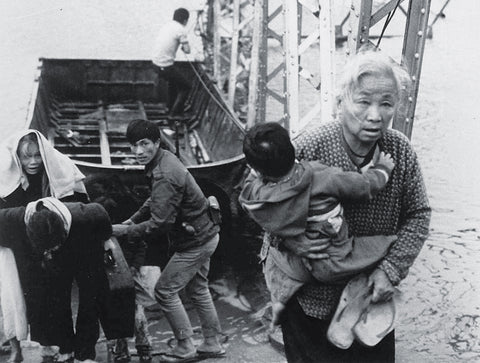
The Flight of the Refugees: How War Impacts Civilians
This heartbreaking photo, taken during the 1968 Tet Offensive, shows a Vietnamese family fleeing the city of Hue, where civilians were massacred by incoming communist forces. In its entirety, the photo shows a destroyed bridge across the waters of the Perfume River in the background. However, I have cropped this image so that we may focus in detail on the experiences of the people in this picture and their individual expressions.
There are many different generations represented in this photo. There are four adults, one elderly woman and two small children — the sandals of the second child are barely visible peeking out from behind a suitcase. The grandmother looks weary but determined; carrying the smallest child, she walks ahead of the others leaving the boat. The man helping the second child and two women with suitcases looks worried. Nearby, one woman struggles to carry their belongings, while the other looks afraid and upset, possibly nearly in tears. They are obviously running for their lives. All they’ve got is each other, the clothes they’re wearing and what little they have managed to carry with them. We can only imagine what their lives were like before this. Looking at them, we know they should be enjoying life together in peace. They should be safe at home. They should not be fleeing with their children up muddy riverbanks, toiling to carry suitcases or experiencing unimaginable turmoil during these precious years of their lives.
Civilians are often passed over in war films — depicted running away in the background, nameless, rootless, ephemeral. Civilians are important people. No matter what war, nation or century they might come from, no matter in what image they might appear, they are just like us. If we want to try to understand something of their experience, we can imagine ourselves in it. Imagine a situation completely beyond your control that leaves you with no safe shelter. Your house might have been bombed or you might have been forced to leave it — with its safety and all its precious memories. Rooms you walked in every day are no longer yours. You have lost your treasures — irreplaceable things you never thought you would lose. All that’s left is memories and sadness. You try to carry everything left in the world that means the most to you — your loved ones and whatever precious fragments of your former life you might be able to hold. You’re desperate to find somewhere safe to go and not lose what you’ve got left. You might expect that people will help you in your plight. But you find that the world doesn’t seem to care much about you. In fact, there are people who, noticing your weakness, cause harm to you. They might be enemies with guns or they might be people capable of helping you who will not lift a finger. You might have surviving family members or even pets still depending on you while everything falls apart in front of your eyes.
Life or death seems to hinge not only on your survival skills but, maddeningly, on chaotic and continually changing circumstances beyond your control. You might know that, somewhere in the world on lofty pedestals far above, leaders with clean-pressed suits, safe beds to sleep in at night and monstrous power could actually do something to stop your suffering. Armies wait on their command. But for whatever reason putting a stop to all the madness seems beyond their grasp. Yet whether or not you spare a thought for world leaders doesn’t actually matter, because you are concerned with basic needs that have suddenly become emergency problems — food, sleep, shelter, money, clothes, medical treatment for yourself or ailing family members, and transportation. Speaking of transportation, you might find yourself having to walk literally hundreds of miles cross-country on swollen and battered feet to get to a safe destination because someone decided to blow roads, bridges or railroads up. Your survival is not guaranteed — but you want, desperately, to live.
Like military service personnel, civilians and refugees who have survived war have incredible and heartrending stories to tell. All the stories are different but the basic human factors remain the same. It’s easy for civilians to get lost in the memory of war. It’s important to stop and think about them — to look at their faces captured in old photos, and to remind ourselves of how war affects all human beings.
historynet magazines
Our 9 best-selling history titles feature in-depth storytelling and iconic imagery to engage and inform on the people, the wars, and the events that shaped America and the world.
